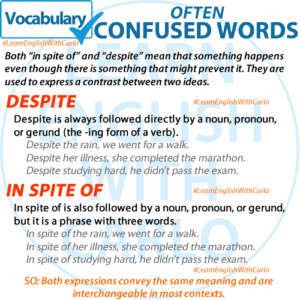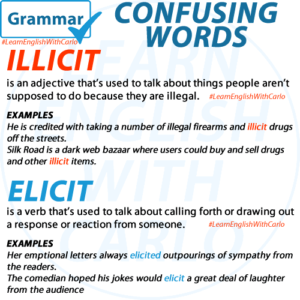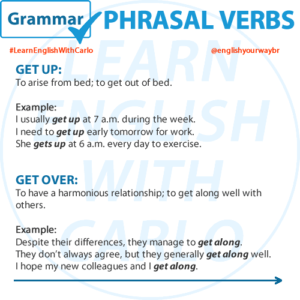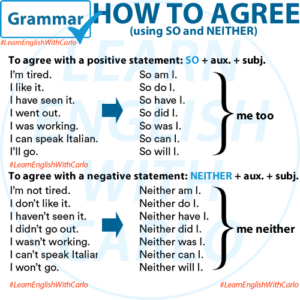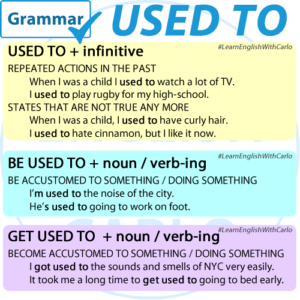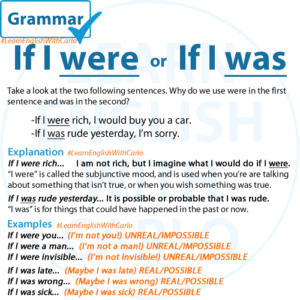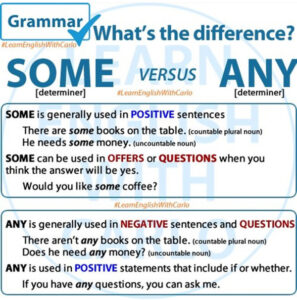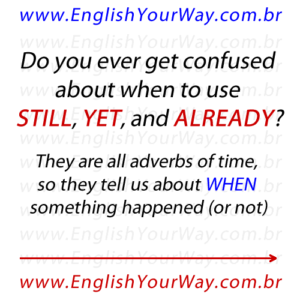A lot of my students ask me for tips on ways they can improve their English outside the classroom. Here are a few that Ilike to pass along. Listen to songs in English and try to identify and understand the words and the meaning. Watch TV series, movies and the news. Use English subtitles if …
Category: INSTAGRAM
Images I've posted to Instagram
Permanent link to this article: https://englishyourway.com.br/ways-to-improve-your-english/
Aug 14
DESPITE vs. IN SPITE OF
Both “in spite of” and “despite” mean that something happens even though there is something that might prevent it. They are used to express a contrast between two ideas. Structure Key Points to Remember Examples with Explanations Practice Exercise Ask your students to rewrite sentences using “in spite of” and “despite”: Visual Aid Create a …
Permanent link to this article: https://englishyourway.com.br/despite-vs-in-spite-of/
Aug 13
GRAMMAR -ILLICIT vs ELICIT
GRAMMAR -ILLICIT vs ELICIT ILLICIT is an adjective that’s used to talk about things people aren’t supposed to do because they are illegal. EXAMPLES He is credited with taking a number of illegal firearms and illicit drugs off the streets. Silk Road is a dark web bazaar where users could buy and sell drugs and …
Permanent link to this article: https://englishyourway.com.br/grammar-illicit-vs-elicit/
Aug 12
GRAMMAR – PHRASAL VERBS with GET
Phrasal verbs with “get” are versatile and widely used in English. They combine with prepositions or adverbs to convey various meanings, making them essential for both casual and formal communication. Here’s a closer look at some common phrasal verbs with “get,” their meanings, and examples to help you understand them better. GET UP Meaning: To …
Permanent link to this article: https://englishyourway.com.br/phrasal-verbs-with-get/
GRAMMAR – HOW TO AGREE
Agreeing in English can be simple and natural once you know the key structures. Whether the statement is positive or negative, these phrases will help you respond appropriately. Agreeing with Positive Statements Agreeing with Negative Statements A: I haven’t read that book.B: I haven’t either. Using “Neither + auxiliary verb + subject”: A: I didn’t …
Permanent link to this article: https://englishyourway.com.br/grammar-how-to-agree/
Aug 09
GRAMMAR – (be) used to
In English, expressions like “used to” and “be used to” can be confusing because they look similar but have distinct meanings and uses. This guide will help you understand the difference and use them correctly. What Does “Used To” Mean? “Used to” is used to talk about habits, actions, or states that were true in …
Permanent link to this article: https://englishyourway.com.br/grammar-be-used-to/
Aug 08
‘If I was’ vs ‘If I were’
Take a look at the two following sentences. Why do weuse were in the first sentence and was in the second? In the first sentence, “If I were rich”, “were” is used because it’s a hypothetical or unreal condition, which requires the subjunctive mood (used for unreal or imagined situations). In the second sentence, “If …
Permanent link to this article: https://englishyourway.com.br/if-i-was-vs-if-i-were/
Jul 31
Understanding the Difference Between SOME and ANY
As an English learner, you’ve probably come across some and any and wondered why we use one instead of the other. These two words have very similar meanings—they both refer to an unspecified amount or number—but their usage depends on the context. Let’s explore the differences with simple rules, examples, and tips. Key Differences Between …
Permanent link to this article: https://englishyourway.com.br/difference-between-some-and-any/
Jul 30
Good vs. Well
Good is an adjective and must modify a noun. Well is usually an adverb. Well is occasionally used as an adjective but only when referring to someone’s health. “Good” as an Adjective: “Well” as an Adverb: “Well” as an Adjective (Health): Here are some common mistakes to avoid when using “good” and “well”: These points …
Permanent link to this article: https://englishyourway.com.br/good-vs-well/
Jul 29
GRAMMAR – Still vs. Yet vs. Already
“Still,” “yet,” and “already” are commonly used adverbs in English that can sometimes be confusing. They help indicate time and the progression of events, but each has its own specific use and nuance. This guide will explain the differences between these three words, complete with definitions and examples to clarify their correct usage. STILL Definition: …
Permanent link to this article: https://englishyourway.com.br/grammar-still-vs-yes-vs-already/


